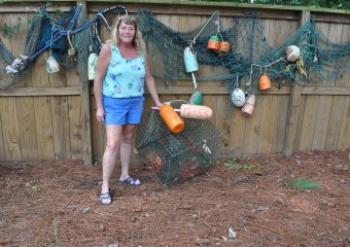Kimberly Carroll

The Saltwater South: Charleston
Here are the stories of men and women who make their living working on the waters of the South Carolina Lowcountry.
Shelley Chance
With her father in the Air Force, Kimberly Carroll grew up living in all parts of the country: Mississippi, Florida, Alaska, and finally Charleston. In 1992 she was working as a radiologist at Roper Hospital when she met Raul Morales, a crabber and native of Cuba, while hanging out on a shrimp boat in Mount Pleasant. They fell in love, and Kimberly started selling fresh catch for Raul’s seafood business, Raul’s Seafood, which was located at Shem Creek on the Geechee Dock. Kimberly sold to 150 restaurants across the Lowcountry. In 2006 Raul passed away, and instead of selling the business, Kimberly worked with one of Raul’s old friends, Bobby Carroll, who convinced her to start selling soft-shell crabs in South Carolina. They brought crabs down from Maryland and Virginia, and built shedding tanks in the backyard of Kimberly’s Mount Pleasant home. The business was successful, defying criticism that selling soft shell crabs wouldn’t work in Charleston. Bobby died in 2013, and a year later Kimberly decided to finally retire from the crab business.
Please Note: The oral histories in this collection are protected by copyright and have been created for educational, research and personal use as described by the Fair Use Doctrine in the U.S. Copyright law. Please reach out Voices@noaa.gov to let us know how these interviews are being used in your research, project, exhibit, etc. The Voices staff can help provide other useful resources related to your inquiry.
The NOAA mission is to understand and predict changes in climate, weather, oceans, and coasts, to share that knowledge and information with others, and to conserve and manage coastal and marine ecosystems and resources. The Voices Oral History Archives offers public access to a wide range of accounts, including historical materials that are products of their particular times, and may contain offensive language or negative stereotypes.
Voices Oral History Archives does not verify the accuracy of materials submitted to us. The opinions expressed in the interviews are those of the interviewee only. The interviews here have been made available to the public only after the interviewer has confirmed that they have obtained consent.
